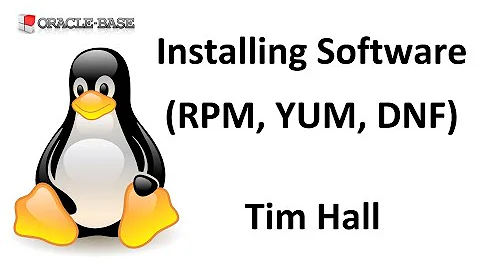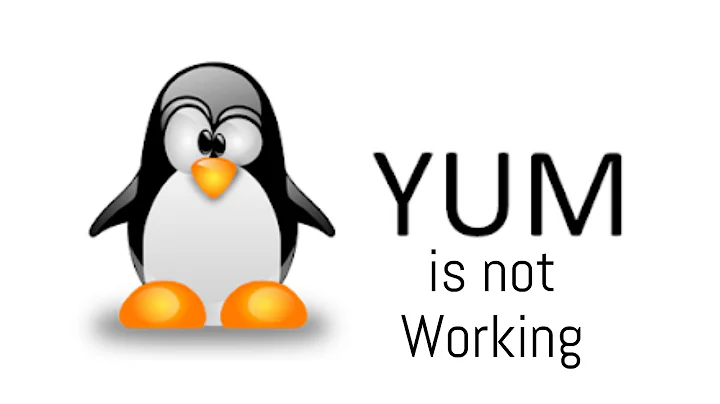How can I install software in Linux with no yum and no wget?
Do you have links or curl? Do you have ssh? Then you have scp, you can transfer for example a tar.gz source file to it and see if you have make and gcc, and build/compile the package on the machine, then set the prefix to somewhere under your home folder and install the package there. You could download and install pacman - then you have a packet manager!
To check the version of the distro usually its in /etc/release or /etc/version or /etc/release-version
But it seems to be an old RedHat machine, so you probably only have rpm. So then use scp to transfer a .rpm package to it (which sutis the redhat version) and install it with rpm -U something. Probably look into scp'ing in a wget .rpm package, after that the rpm should work better.
Related videos on Youtube
e9t
Updated on September 18, 2022Comments
-
 e9t over 1 year
e9t over 1 yearI'm a newbie to Linux (that mainly uses Windows and Mac OS X) needing some advice. I was trying to install git on a Linux machine today, and encountered some problems:
-
Not knowing the version of the installed OS, I've opened the
/proc/versionfile which said:Linux version 2.6.9-42.0.2.ELsmp ([email protected]) (gcc version 3.4.6 20060404 (Red Hat 3.4.6-3)) #1 SMP Thu Aug 17 17:57:31 EDT 2006 -
Then, as written in the git documents (http://git-scm.com/download/linux), I assumed I could use the
yum install gitcommand for Fedora, but got the following result.[root@myserver ~]# yum install git -bash: yum: command not found -
So I tried installing
yumusingwget, but wasn't so lucky.[root@myserver ~]# wget http://linux.duke.edu/projects/yum/download/2.0/yum-2.0.7.tar.gz -bash: wget: command not found -
I googled and found this page and this page, so tried installing
yumwithrpm, but only got a result full of question marks. (Possibly an encoding problem, hmm...)[root@myserver ~]# rpm -Uvh http://www.eomy.net/linux/install-yum-x86_64/wget-1.10.2-0.40E.x86_64.rpm http://www.eomy.net/linux/install-yum-x86_64/wget-1.10.2-0.40E.x86_64.rpm(??)?? ?????ϴ ?: /var/tmp/rpm-xfer.TbuAOu: V3 DSA signature: NOKEY, key ID 443e1821 ?غ?.. ########################################### [100%] wget-1.10.2-0.40E Ű????̹??ġ?Ǿ?ֽ??ϴ wget-1.10.2-0.40E???? ??ġ?Ǵ/usr/bin/wget ?? wget-1.10.2-0.40E Ű????ϰ? ???ϴ wget-1.10.2-0.40E???? ??ġ?Ǵ/usr/share/man/man1/wget.1.gz ?? wget-1.10.2-0.40E Ű????ϰ? ???ϴ [root@myserver ~]# -
Finally, when I typed
rpm --versionin the terminal, I got the below results.[root@myserver ~]# rpm --version RPM ???? - 4.3.3
I would like to know what I can do or possibly try now. Is it not possible to
wgetoryumanything in my situation? Or is there any magical tool like homebrew (Link) that I can use?As jhcaiced has mentioned in his comments, I've added the output of some more files:
-
vi /etc/issueRed Hat Enterprise Linux AS release 4 (Nahant Update 4) Kernel \r on an \m -
vi /etc/redhat-release(no file named /etc/release)Red Hat Enterprise Linux AS release 4 (Nahant Update 4) -
/etc/version and /etc/release-version do not exist.
Plus, no
apt-getand noyastin the system. The 32 bit packages didn't work either.-
 Admin over 11 yearsYou don't have
Admin over 11 yearsYou don't haveapt-geteither, I take it? -
Jacob Tomlinson over 11 yearsHave a look at linuxers.org/howto/…
-
 Admin over 11 yearsHow did you decide on downloading the
Admin over 11 yearsHow did you decide on downloading thex86_64version of the packages? Might it not be the case that you're running a 32 bit system and that you should use those packages instead? -
 Linuxios over 11 yearsAlso, you have to remember that Linux has many different package managers. Fedora and RHEL use rpm, others use yum, and then all Debian based distros use apt-get.
Linuxios over 11 yearsAlso, you have to remember that Linux has many different package managers. Fedora and RHEL use rpm, others use yum, and then all Debian based distros use apt-get. -
jhcaiced over 11 yearsCan you publish the output of /etc/issue, /etc/release, /etc/version, /etc/release-version ? (may be not all of them exist). This provides information about what linux distribution is installed on this particular machine an would help to find an answer to your issue.
-
poz2k4444 over 11 yearsalso you can try with
yast, it dependes on the distro you are using -
Jjames over 11 yearsThere's something extremely odd...how are you connecting to that server? Where does that server come from? Is it an old machine or something new? Also,
man rpmtells me that the switch for installing is-i, not-U...rpm -i PACKAGE. -
 e9t over 11 years@Bobby The server is one at my department at school. The former administrator quit his job, and I was asked to maintain the server until a new admin comes. The thing is, I'm not close with Linux... at all. The machine it self is very old, and is supposed to be replaced with a new one at the end of the year, but meanwhile I'm stuck with this oldie. Thanks for the notice on
e9t over 11 years@Bobby The server is one at my department at school. The former administrator quit his job, and I was asked to maintain the server until a new admin comes. The thing is, I'm not close with Linux... at all. The machine it self is very old, and is supposed to be replaced with a new one at the end of the year, but meanwhile I'm stuck with this oldie. Thanks for the notice onrpm, Bobby.
-
-
 e9t over 11 yearsYes, I have curl, ssh and scp. Guess I'd better try getting source codes and
e9t over 11 yearsYes, I have curl, ssh and scp. Guess I'd better try getting source codes andmakeing things... thanks for your advice :)




